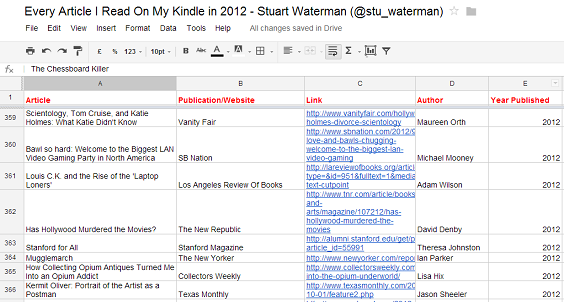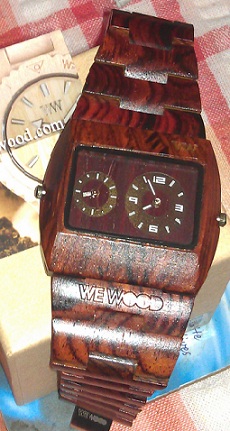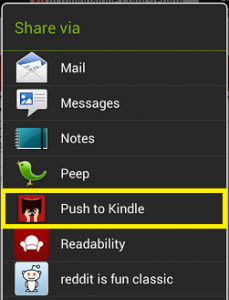
Into #longreads? Check out my Google+ community, Non-Fiction Addiction
The best thing about the Christmas/New Year period is All The Lists. Lists lists lists. Lists. (Children may feel otherwise, but what do they know.)
I love browsing end of year lists. It’s a great way to catch up on stuff you missed, and it fills those somnolent post-turkey holiday days like a charm. Whether the lists are in newspapers, mags, blogs… Best books, best gadgets, best songs, worst songs, worst pop-up restaurants where you can’t reserve a table and the queuing system amounts to ‘elbow a fellow aspiring diner in the trachea to get a whiff of hipster-fried chicken’ (Wishbone Chicken Brixton, you are death); yes, I love all the lists.
In bygone years I tended to create sprawling music playlists. A top ten of the year was no good. It always needed to be comprehensive, unwieldy and, ideally, drive me to the brink of insanity while I compiled it (example: my Best Of 2010 Spotify playlist features 192 tracks). You know you’ve made a good fist at a list if the mere thought of trying to fulfil your original vision makes you want to cry.
Which brings me to my 2012 end of year list. As I’ve babbled previously, this year has seen my reading habits change significantly. I didn’t read many books (boo), but I did learn that I could send longform articles to my Kindle (yay). Since sending stuff to my Kindle creates a record of all such articles in my Amazon account, I figured it might be interesting (for me, if nobody else) to put everything I’d read this year into a list.
Sadly this only occurred to me in November, and since Amazon accounts only record text information as opposed to links, it meant I had to (I say ‘had to’):
1. Trawl all the way through my Amazon account
2. Copy the title of each article and/or its author
3. Paste this information into Google
4. Go to the source article link and copy the relevant info & URL
5. Paste this information into my list
Now, it might not sound that arduous. But by the time I’d finished compiling my list of Every Article I Read On My Kindle In 2012, it was 457 items long. That’s a whole lot of copying and pasting, and I’d say it’s easily the most boring way to spend time I’ve yet devised. It really cut into my Christmas shopping efforts, too (this year everyone will get a Keep Calm And Carry On tea towel and be happy with it).
This list may be something people like to browse through. I hope so, given the time I spent on it. But when I got the idea I think my main motivation was this: I don’t think I’ve ever seen anyone do this before. Why would they? It’s insane, and people have lives. So while it would almost certainly have been generally more useful to create a ‘Best of 2012’ list, I figured people like Longreads and Longform.org have that covered.
(Update: OK, I caved. Here are my 30 Great Reads Of 2012, compiled for The Electric Typewriter; and here’s a Readlist of all of them, should you wish to export them all to your device in one go.)
So my list is unfocused, wide-ranging and includes articles from before 2012. The oldest was published in 1869, but the majority are from 2000 onwards. It’s all non-fiction, and it paints a picture of a reader who is variously interested in, among other things, Scientology, serial killers, Bill Murray, paperclips, pornstars, Carly Rae Jepson, magic, Reddit, David Sedaris, con artists and the Olympics.
If you take a look at it and find something that piques your interest, I hope you’ll share it with others. It might make my RSI worth it.
Every Article I Read On My Kindle In 2012
A mention for the places where I tended to find all these links, and which I continue to browse regularly:
I’ve also created a
longform RSS bundle that collects a bunch of these into a single feed which you can add to Google Reader.
—
Update: Thanks to
@hollyjunesmith for sharing the list with one of the Twitter big dogs – and welcome to those who ended up here as a result.


 My review of the
My review of the  This is just a quick follow-up to my post about
This is just a quick follow-up to my post about 
 easel.ly
easel.ly